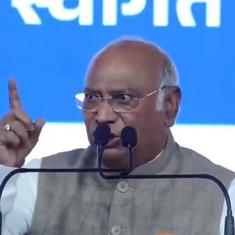The decline in the power of the princely states after the establishment of British suzerainty in India led to the gradual withdrawal of royal patronage to Hindustani music. The colonial government was disinclined to patronise any activity that did not directly or indirectly serve its purpose of exploiting India economically and politically. Traditional arts, such as music, were prime casualties and musicians had to perforce find new patrons.
They identified the Indian commercial, industrial and intellectual elite in colonial cities as prospective patrons and began migrating towards these areas. Enjoying pride of place in colonial India, Bombay attracted scores of musicians looking to take advantage of these potential benefactors.
Sher Khan (1805-1862), nephew and disciple of Ghagge Khudabaksh of the Agra lineage, was one of the earliest prominent musicians to have travelled to Bombay and taught many students. Later, others from the Agra lineage, like Natthan Khan – the son of Sher Khan – Natthan Khan’s sons and their relatives settled in the city and trained scores of students. This is how Mumbai played a major role in disseminating the Agra gayaki among vocalists not belonging to any of the hereditary families associated with Hindustani music.
Of the members from the Agra gharana family, one of Natthan Khan’s sons, Vilayat Hussain Khan, deserves special mention for his contribution to the spread of Hindustani music in Bombay. He trained several students, who in turn taught many others. Today, there are well-known young vocalists in the city who owe at least a part, if not the whole, of their musical existence to the knowledge disseminated wholeheartedly by Vilayat Hussain Khan. Read more about his legacy here.
Khansahib Vilayat Hussain Khan (1895-1962), legendary vocalist of Agra Gharana.
— Pokri Poki (@PokriPoki) August 13, 2019
Img src: Premrang (a book written by Khansaab's disciple Pt. Ratnakanth Ramnathkar) pic.twitter.com/UJyRrpBmrV
But in the context of this series, I have yet to come across a street or garden in Mumbai named after Vilayat Hussain Khan to commemorate his life and work in the city. Fortunately, the city hosts some places named after his students and “grandstudents”. Some of them have already been featured in previous editions of the series on streets and gardens named after Hindustani musicians: Azmat Hussain Khan and Jagannathbuwa Purohit learnt from Vilayat Hussain Khan, and Manik Varma learnt from Purohit.
In this context, one often wonders whether a street in the neighbourhood of Forjett Street (now Vasantrao Naik Marg) in South Mumbai, where Khan lived for many years, or a garden in the vicinity could have been named after him.
We continue our series with yet another artist from the same tradition. Located in Thane, is a children’s garden and a street named after Ram Marathe, the celebrated Hindustani vocalist, actor-singer for Marathi theatrical productions and music composer. Marathe was a student of several musicians such as Wamanrao Sadolikar, Yeshwant Sadashiv Mirashi (familiar to music lovers as Mirashi buwa), Manohar Barve, Krishnarao Phulambrikar (more popular as Master Krishnarao) and Narayan Shripad Rajhauns, famously known as Bal Gandharva.
Marathe also learnt from Jagannathbuwa Purohit and Vilayat Hussain Khan and assimilated elements of the Gwalior, Agra and Jaipur-Atrauli styles in his singing. Here are two tracks featuring the maestro.
The first is a recording of a concert from the Akashvani Sangeet Sammelan organised by All India Radio in 1976. Marathe sings two compositions in the raag Chhayanat. He is accompanied by Suresh “Bhai” Gaitonde on the tabla and VR Pendharkar on the harmonium. The vilambit, or slow bandish, is set to the 14-matra Jhumra, followed by a drut or fast composition in the 16-matra Teentaal.
The next track is a video recording of a live concert presented as part of a three-day event held at Mumbai in 1985 to celebrate the maestro’s 61st birthday. Marathe presents two compositions in the raag Basant Bahar, a raag prescribed for the spring season.
The first composition is set to a medium-tempo seven-matra Rupak and the second is a composition created by him for the Marathi musical Mandarmala. Harmonium and tabla accompaniment are provided by well-known musicians Govindrao Patwardhan and Suresh Talwalkar.
One of India’s leading tabla players, Aneesh Pradhan is a widely recognised performer, teacher, composer and scholar of Hindustani music. Visit his website here.










